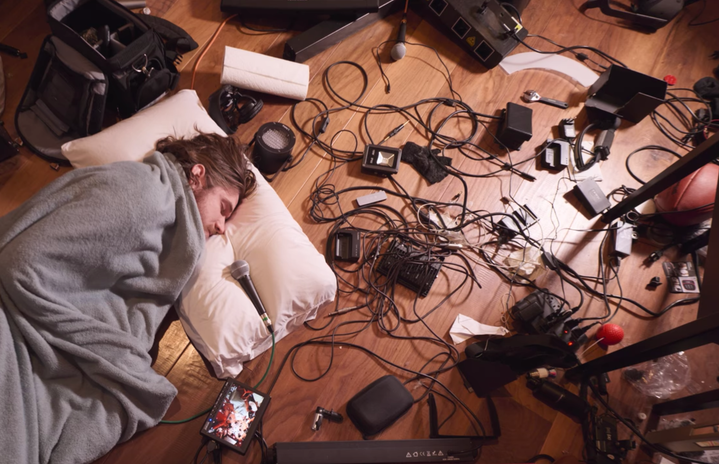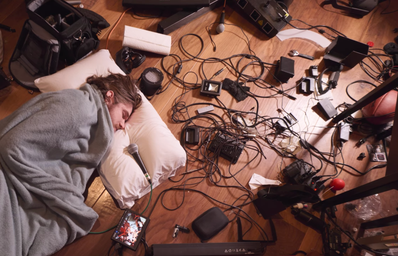On May 30, Bo Burnham released Inside, his self-made quarantine Netflix special, conceived over the course of a year. Not only was the special particularly impressive due to the fact that Burnham wrote, shot, directed, and edited it entirely by himself, but the lyrics and melodies in his self-written songs are incredibly catchy (I’ve had “All Eyes on Me” stuck in my head for the past several days), clever, and creative. But on a deeper level, the special struck a chord with Gen Z. Burnham delved into his negative experiences with mental health that existed pre-pandemic, and how these struggles became exacerbated by quarantine last year.
Burnham is a 30-year-old millennial, but the themes in his special surrounding mental health resonate with Gen Z due to our struggles with mental health as a collective, both pre-pandemic and during the pandemic. Throughout the hour-and-a-half long special, Burnham constantly references living in quarantine. In “Content,” Burnham reflects on his struggles of even getting up out of bed in the morning during quarantine, alluding to potential depression. He sings, “Robert’s been a little depressed, no / And so today I’m going to try just / Getting up, sitting down, going back to work / Might not help, but still, it couldn’t hurt.”
In “Welcome to the Internet,” Burnham discusses social media in the context of COVID-19, which is also very applicable to Gen Z. Gen Z is a huge consumer of social media content — spending about five hours a day on our phones (I hate to say, I sometimes spend even more time than that) — and the pandemic only heightened that as we had more time to stay inside our homes with nothing else to do. Burnham sings that “apathy’s a tragedy and boredom is a crime” while online, underscoring the essence of hyper-engagement and an overload of information that Gen Z partook in during the pandemic especially. This overstimulation of spending six to eight hours a day on your phone, especially on social media, which is reportedly known for being detrimental to your mental health, can be a lot.
Burnham is a millennial, but the themes in his special resonate with Gen Z due to our struggles with mental health as a collective, both pre-pandemic and during the pandemic.
Last year took a toll on many people’s mental wellbeing, especially Gen Z. According to a study conducted by the Center for Disease Control (CDC), one in four 18 to 24-year-olds said that they have seriously contemplated death by suicide during the pandemic, and almost 75% of them reported at least one negative mental health symptom — such as depression or anxiety — in June 2020. In another study conducted by the American Psychological Association (APA), Gen Z adults (ages 18 to 23) were the most likely generation, compared to millennials, boomers, and older adults, to report that their mental health had worsened since the beginning of the pandemic.
There are several identifiable reasons why Gen Z was particularly impacted by the pandemic in comparison to other generations. Gen Z experienced many “micro-losses” last year: things like losing high school or college graduation ceremonies, not being able to attain jobs or internships due to limited opportunities, and having to learn remotely (which was rough, to say the least). Although these things may seem small, they add up into this huge mountain of losses, which can be a lot for a person to carry and deal with.
Additionally, for Gen Z, this is the first major national and worldly event that has happened to us. Our parents’ big life-changing event was likely 9/11 — but most of us don’t remember 9/11 because we were too young, or weren’t even alive when it happened.
Gen Z’ers took to TikTok to share their views on the special and especially how it resonated with them. One user said, “I think that the room that [Burnham is] stuck in is a metaphor for performing at large because he’s stuck in there. He can’t get out. And even if he could, what would be left for him? Because at some point, he expresses fear at leaving the room. It’s a shitty room and it’s actively damaging his mental health, but he’s safe in there.”
Although the topic of teenage mental health has been discussed before, Burnham amplifies the issues through the lens of humor, which is one of the easiest ways to engage with Gen Z.
And that’s how many Gen Z’ers felt during quarantine at the start of the pandemic — and how many are even feeling now. As COVID-19 cases are lessening and the state of the pandemic is improving, there is also this newfound sense of fear and anxiety surrounding leaving our homes. Burnham encapsulates this fear and anxiety in “Goodbye” when he sings, “I promise to never go outside again” and “Now come out with your hands up / We’ve got you surrounded.” Although Burnham’s fear is more about going back onstage and performing live again, his lyrics can also be translated and analyzed through the lens of Gen Z: a fear surrounding going back to school, socializing again, and returning back to “normal.” Another Gen Z user posted a TikTok of a timid Burnham peeking out the front door of his house with the caption, “Me, fully vaccinated, finally emerging from quarantine and realizing my social anxiety has gotten worse.”
This is not the first time Burnham has connected with his Gen Z audience. His movie Eighth Grade encapsulates the horror that is middle school through the perspective of a 13-year-old girl, shedding a light on topics such as teenage social anxiety. In his speech at the Spirit Awards in 2019, Burnham proudly said, “[I’ve been] told very often that I’m a comedian only for thirteen-year-old girls. And f*ck yeah I am! I feel really proud of that. They deserve to be paid attention to and taken seriously.”
All in all, though Burnham is an older millennial, Gen Z can relate so much to Inside because we see our struggles with mental health reflected in Burnham’s story, and in his ability to use self-deprecating humor as a coping mechanism to talk about his mental illness. Although the topic of teenage mental health has been discussed before, Burnham amplifies the issues through the lens of humor, which is one of the easiest ways to engage with Gen Z as opposed to something more heartfelt or cliché. Post-pandemic, the conversations surrounding mental health need to continue in order to provide mental health support and resources for Gen Z as well as shift the stigma. In order to best support Gen Z and their mental health needs, our voices need to be magnified in the discourse, and Burnham’s special is a good start.
Studies Cited:
American Psychological Association. (2020). Stress in America 2020: A National Mental Health Crisis.
Czeisler, M., et al. (2020). Mental Health, Substance Use, and Suicidal Ideation During the COVID-19 Pandemic — United States, June 24–30, 2020.
If you or someone you know is seeking help for mental health concerns, visit the National Alliance on Mental Illness (NAMI) website, or call 1-800-950-NAMI(6264). For confidential treatment referrals, visit the Substance Abuse and Mental Health Services Administration (SAMHSA) website, or call the National Helpline at 1-800-662-HELP(4357). In an emergency, contact the National Suicide Prevention Lifeline at 1-800-273-TALK(8255) or call 911.


